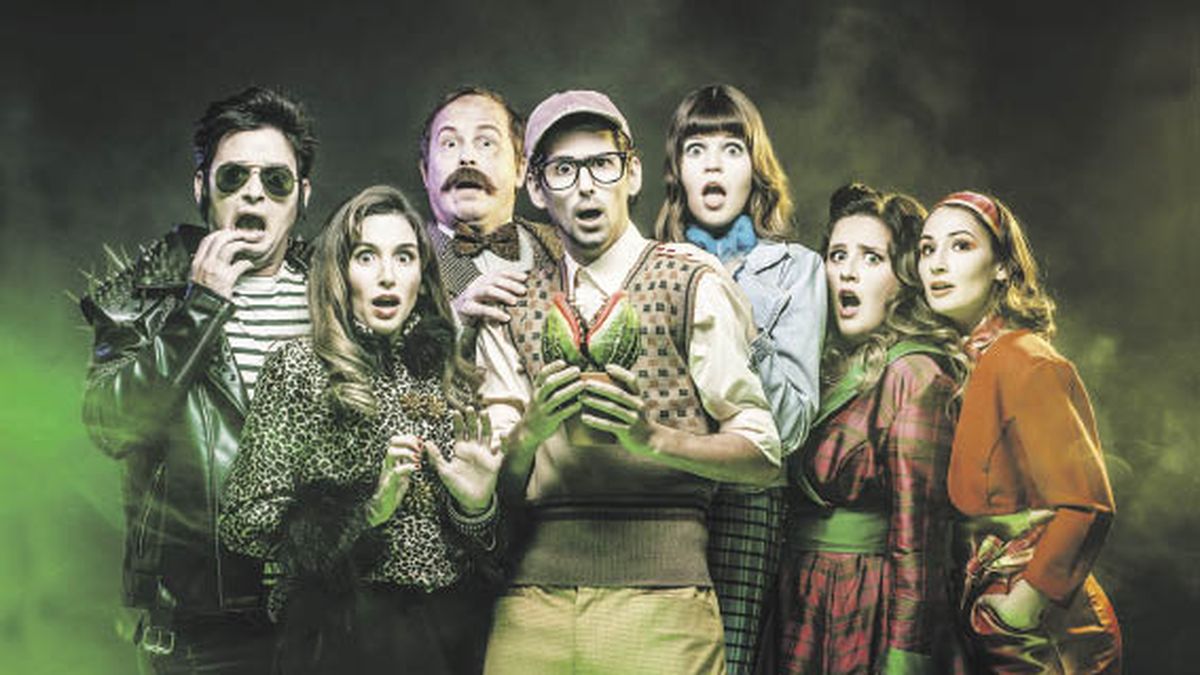Journalist: What is the genesis of this project?
Axel Jeannot: It comes from before the pandemic, when the producer called me to do it because he had bought the rights. We did auditions, we chose the cast and covid came. We put everything on hold for two years and we revived it now, having more clarity that we could premiere without having functions cut off.
Q.: What versions do you remember?
AJ: I am a fan of this musical in particular, also the words and music of Menken and Ashman. I saw the ’86 movie, I saw the Argentine version in theater with Sandra Ballesteros and Diego Ramos, I also saw one on Broadway about 15 years ago and now there is a new one that can be seen thanks to YouTube. The story never changes, what is updated is the aesthetic.
Q.: How did you update it for this version?
AJ: We gave it a comic book aesthetic, because even though it’s set in the ’50s, it’s a fictional world. We gave something to the Tim Burton in the line “The young man of scissors hands”, where nothing is quite real. The work is science fiction, it combines comedy, black humor but it is very eighties, written at that time, with which there is a lot of rock. The narrators are the Vocat, an exceptional ensemble that has been working for a long time with which there is something that did not have to be done beforehand, such as filling in voices. Also with great actresses and dancers, and this Fede Couts as Seymour, a cute, goofy, innocent and fun character who gets darker and conflicts, feels tremendous guilt for wanting fame and money.
Q.: What topics does this musical address?
AJ: It’s like Faust, to get what you want you have to be able to do something else. He plays from satire and with exaggerated performances because this character who is in love with Audrey, although he does not commit crimes, he does not prevent them from happening either. He has to do with the blood that must be given to the magical plant so that it grows and from there he can obtain what he is looking for. Here is the question of how far he will go to be famous, popular and get Audrey’s love. Then he burrows deeper into his demons and the plant ends up eating them all, it’s a Greek tragedy. In fact, the narrator works like a Greek choir, something the authors did on purpose. That Greek choir tells the emotions of the characters, they are the ones who manage and weave everything, they enter and leave, they sing like rock choruses, they are accomplices of the androgynous plant, which came from another planet to conquer the world.
Q.: Why does a producer embark on buying a work whose rights are paid in dollars?
AJ: Because he always wanted to do this work and was negotiating to have the deadlines extended. The owners also had concessions due to the pandemic, and it wasn’t the current Argentina either, but the one of 2019. Now it would be much more expensive to buy it and we work as a cooperative, knowing that we make the effort and almost for the love of art.
Q.: What else did you take into account for the setting?
AJ: We respect the translation but there are updated texts and jokes with licenses that we take to do something different. It takes place in a world without cell phones, set in a parallel and fictional universe. We look for the curve from the beginning, with a certain sadness, until it progresses, what is seen with the aesthetics, the costumes, the light. The plant has three moments, first it is very small, then bigger and then huge, when the withered flowers that are sold to the first customer appear, everything begins to become more colorful and exuberant. The plant invades the store, with roots, all as a metaphor that eats the world, like a virus. We take advantage of the Astral, which is a large theater but manages a certain intimacy and we also need a climate for dark terror, because let’s not forget that the plant eats people.
Q.: How do you see theater and music today?
AJ: We did a season with Vox Pop for 20 years and I went out to eat the court after so much confinement. As a spectator I see a lot and beyond that the theater is not something totally profitable, I notice a lot of movement in the commercial and in the off, with people who go, buy tickets, that excites. The Argentine public likes to go to the theater, see things live, well done, with passion and dedication. That there is no economic crisis or devaluation to stop it. I know that I am very excited and optimistic and beyond the economic gain, that people come is what we needed.
Source: Ambito
David William is a talented author who has made a name for himself in the world of writing. He is a professional author who writes on a wide range of topics, from general interest to opinion news. David is currently working as a writer at 24 hours worlds where he brings his unique perspective and in-depth research to his articles, making them both informative and engaging.




